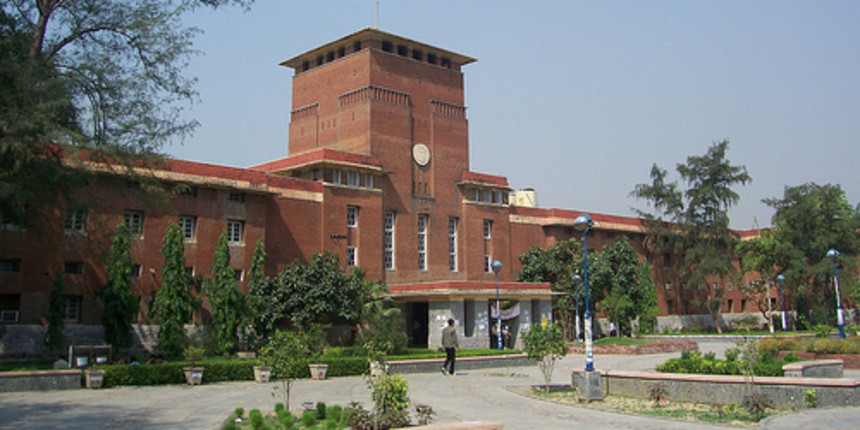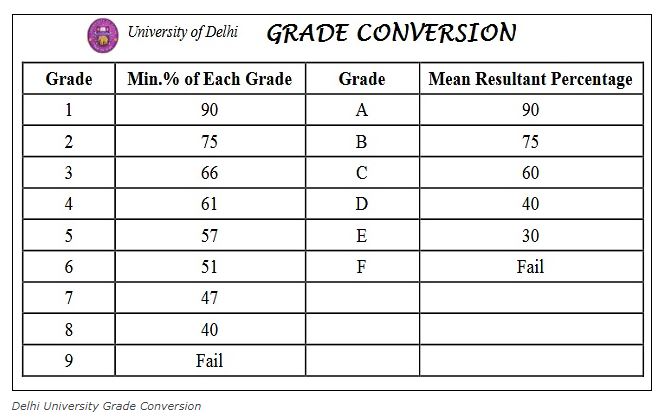GITAM University B.A. Admissions 2026
AICTE Approved | NAAC A++ | Category 1 University by MHRD | Highest CTC 1.4 Cr LPA from Amazon
Delhi University Admissions 2022: How to Calculate Best of Four Marks - The DU Admission 2022 season is nearly upon us, and registration for UG level courses will begin in August on the official website du.ac.in. For candidates, DU admission is based on a merit-based system. Obtaining admission to DU colleges is undoubtedly one of the most difficult tasks in the UG courses. So, in order to simplify the admission process, DU has implemented the 'best of four rule' for the percentage calculation mechanism. Let's look at what 'Best of Four Marks' means in the admissions process and how to calculate it when looking at the DU 2022 cut-off. Candidates can determine whether they are eligible for DU admissions 2022 by calculating their 'Best of four' subject marks. Interested candidates must meet the cutoff marks, based on which qualified candidates will be admitted to one of the 64 DU affiliated colleges located throughout Delhi. There are 69,554 UG seats available in DU-affiliated colleges, which can be filled based on candidate performance in the best four subjects.
This Story also Contains

Thus, in this article by Careers360, we have covered all details regarding DU best of four and other critical aspects that must be kept in mind to make the Delhi University admission process easy and smooth.
Also Read:
Particulars | Data |
Number of Colleges | 91 (64 for UG merit based admissions) |
Number of Faculties | 16 |
Number of Departments | 86 |
Number of Seats | 69,554 |
Paid Registration | 353919 |
The University of Delhi takes into account the four subjects in which students received the highest marks in their qualifying examination (10+2). Subjects are chosen based on deductions and additions/cut off marks (academic subjects from DU List A and List B) and sometimes on the subject combination one had at the 10+2 level. When calculating the best of four marks, aspirants should keep the following points in mind.
DU best of four subjects should have:
One Language (Core/Elective/Functional)
Admission is sought in one subject – A candidate must include the subject in Best of Four for the Honours programme to which admission is sought, or a 2.5 percent penalty will be applied to the calculated Best of Four percentage. (For example, if a candidate wishes to pursue a B.A. in Hindi, he or she must have studied Hindi in Class XII.) If a candidate belongs to, say, the PCB stream, their 'Best of four' aggregate marks will be reduced by 2.5 percent.
Any two additional academic/elective subjects from List A – If a candidate does not include the subject as listed in List A, a 2.5 percent penalty will be applied to the Best of Four calculated.
List A contains the disciplines offered by the University of Delhi for admission to three-year undergraduate programmes that must be treated as Academic/Elective subjects. All discipline subjects must have at least a 70% theoretical component and a 30% practical component. Internal assessments and continuous evaluation are not included in the theory component.
List A
After seeing List A and List B together, calculating "DU best of four 2022/best four combinations" may appear intimidating. Candidates can make their calculation process easier and faster by following the steps listed below one by one.
Choose a subject (for example, commerce, economics, English, accounting, or any other subject listed in Lists A and B).
In the case of offbeat subjects that you want to choose but are not on the list, choose any four or three subjects from the two lists and one other subject of your choice that is not on the list. It is required that you select one language of your choice as well as three academic subjects.
Now compute the total percentage you obtained (total the marks obtained in each subject and divide it with the total number of subjects).
1. Let us assume that your score in different subjects is as follows: -
Political – 94
English – 88
Business Studies – 92
Accounts – 90
Now, you need to add the total marks
94+88+92+90 = 364.
The percentage will be 364/4= 91%
Now, the effective percentage for B.A. (Hons) English is 91%. B.Com (Hons) is 91% and B.A. (Hons) History is 91%. Deduct 2.5 from the percentage, and the final percentage will be 88.5%.
2. Let us assume that you are seeking admission to B.Com. program. You have scored the following marks in different subjects: -
Economics – 94
English – 88
Business Studies – 92
Accounts – 90
Now, you need to add the total marks
94+88+92+90 = 364.
The percentage 364/4= 91%
The effective percentage for B.Com is 91%
For B.A. program 91% - 5% = 86%
Candidates seeking admission to an Honours Programme at Delhi University must include the subject (the subject for which admission is sought) in the Best of Four subjects (One Language and Three Subjects); failure to do so will result in a 2.5 percent disadvantage in the best of four marks.
Wherever a board does not offer Commerce as a subject, accounting will be treated as equivalent to Commerce.
Biology, Biotechnology, and Business Studies will be classified as academic/optional subjects.
Candidates seeking admission to the Honours programme of subjects – Music and Physical Education – must include the respective subjects in their best of four; failure to do so will result in a 2.5 percent disadvantage in the aggregate of the best four subjects' marks.
For admission to B.Sc (Hons.) in Computer Science only, the subject 'Information Practices' will be considered equivalent to Computer Science.
Candidates seeking admission to any Honours language course who have studied the elective language will be given a 2% advantage over others.
If a candidate has studied both elective and core languages, the core language will be considered a language, while the elective language will be considered an academic/elective subject.
Admission to the BA (Hons.) in Hindi Patrakarita and the BA (Hons.) in Journalism will be based on the 'Best of Four' subject percentage, as in the BA (Hons.) Hindi and BA (Hons.) English.
Business Mathematics will be treated as equivalent to Mathematics for admissions to B.Com (H) / B.Com only.
In case, if more than one no-listed elective/academic subject as notified by DU is included for 'Calculation of Best of Four', a disadvantage of 2.5% each in 'Best of Four' will be levied for admissions to BA/B.Com, besides a disadvantage due to change of stream.
Legal Studies will be treated at par with academic/elective subjects for the purpose of admissions to BA (H) Political Science.
Mass Media Studies will be treated at par with academic/elective subjects for the purpose of admission to BA (H) Journalism (English/Hindi).
Admission to BA (Hons.) Applied Psychology will be based on ‘Best of Four’ subject’s percentage as in BA (Hons.) Psychology.
Admission to the BA (Hons.) Social Work programme will be based on a 'Best of Four' subject percentage, which will include one language and three academic/elective subjects from List A.
For admission to Honours in Economics and Commerce, candidates must only have studied and passed Mathematics at the qualifying exam level.
If a candidate seeks admission to Honours in any language programme in which he studied as an elective language at the qualifying exam level, he will be given a 2% advantage over the other candidates in the 'Best of Four' subjects.
If a candidate has not studied the language at the qualifying exam level and is seeking admission to Honours in that language, he or she will be penalised by 5% in 'Best of Four' subjects.
Candidates seeking admission to Honours in English and Hindi must have studied and passed the respective language in the qualifying exam and must include it in the 'Best of Four' percentage calculation.
In the event of a change of stream, a maximum of 5% penalty may be imposed on the 'Best of Four' percentage. Furthermore, the college will be required to notify the University of the actual deduction of up to 5% on their websites.
If a candidate only wishes to pursue a BA Vocational degree, related vocational subjects will be treated equally with academic/elective subjects.
For admission to Vocational Courses, a maximum of two vocational subjects may be included in the 'Calculation of Best of Four'.
If a candidate chooses Modern Indian Languages (MIL) other than Hindi as a programme, a maximum of 10% advantage may be given in the 'Best of Four' percentage in DU colleges where MIL is offered as a programme.
Similarly, the selection criteria for Mathematical Sciences, Science, and Home Science programmes remained unchanged last year. However, subjects to be included for the Basis of Selection, i.e. PCM/PCB/PCMB, must have at least 70% of the theory exams, excluding internal assessments and continuous evaluation in the qualifying exam, or a penalty of 10% of the maximum marks may be imposed on each subject.
DU Best of Four - Grade Conversion

The cut off marks published by the university serve as the entry point for admission to DU colleges in 2022. With a large number of applicants received each year, the best of four subject combination trend, and the level of CBSE and other equivalent board examinations becoming standardised, the year on year trend of DU cut-offs is on the rise.
The DU cut off 2022 of various colleges includes the minimum marks/percentile that a student must achieve in order to be admitted to a course. The final merit-based selection of students is based on the candidate's ability to meet the aggregate marks required to select DU's best of four subjects.
The University of Delhi establishes some basic criteria by which students are shortlisted or considered eligible to apply for or be admitted to Delhi University. Though many DU colleges have different eligibility requirements for admission seeking candidates, there are some basic requirements that are the same for all. Based on the eligibility criteria, the DU application form is accepted by the DU authorities. The DU eligibility criteria for programmes, departments, and admission modes are listed in the tables below. Aspiring students will be able to determine whether they are eligible to apply for DU 2022 admissions by understanding the DU 2022 eligibility criteria. As a result, knowing this will have advantages for them, such as avoiding disqualification from admission at a later stage.
People are also interested in -
NAAC A++ Accredited | Ranked #12 by NIRF
NAAC A+ Accredited | Among top 2% Universities Globally (QS World University Rankings 2026)
Recognized as Category-1 Deemed to be University by UGC | 41,000 + Alumni Imprints Globally | Students from over 20+ countries
Among top 100 Universities Globally in the Times Higher Education (THE) Interdisciplinary Science Rankings 2026
NAAC A++ Accredited | Ranked #11 by NIRF
Avail upto 100% Merit Based Scholarships